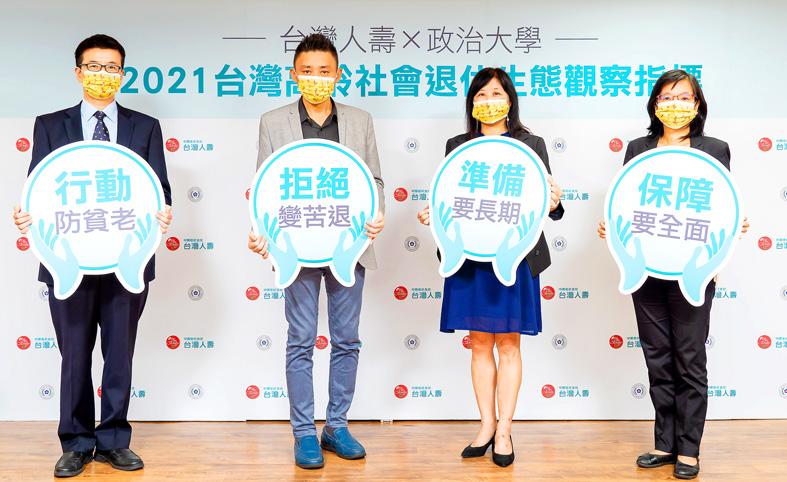More than half of Taiwanese intend to continue working after retirement, while 72 percent would keep wealth management services after retirement to bolster their financial security, a survey released yesterday by Taiwan Life Insurance Co (台灣人壽) showed.
“Retirement has traditionally been viewed as the start of a second life, during which people have the financial stability to allow for a leisurely lifestyle, but this survey indicated that many people do not think that will happen,” National Chengchi University banking professor Sharon Yang (楊曉文) said.
According to the poll, 50.4 percent of respondents said they would not have enough pension when they retire, and 74 percent said they expect the government to reduce pensions.

Photo courtesy of Taiwan Life Insurance Co
Ninety-five percent said they were worried about coverage under the nation’s public health system, while more than 60 percent said they were concerned about coverage under the long-term care system, the survey showed.
While 74 percent of respondents said they had purchased medical insurance policies, long-term care insurance was much less popular, with only 35 percent saying they had bought such policies, the survey showed.
NOT REALISTIC
More than 50 percent said they hoped to live at retirement facilities with monthly expenses of less than NT$30,000, but Taiwan Life said that was not practical, adding that most respondents were not aware of how much money they need for retirement.
On average, respondents in this year’s survey said they plan to allocate NT$8,216 per month to prepare for retirement, down from NT$15,086 last year, while they plan to save NT$6,528 yearly for long-term care plans, which was also down from NT$9,905 last year, the insurer said.
“It might be the COVID-19 outbreak that reduced people’s preparation for retirement or long-term care, as people need to spend money fighting the pandemic,” Yang said.
Nearly 40 percent of those who have not retired said they have not finalized their retirement plans yet, but for those who had, they plan to rely on fixed deposits for their retirement, Taiwan Life said.
The poll, which was conducted in May, collected 1,202 valid responses.

Sweeping policy changes under US Secretary of Health and Human Services Robert F. Kennedy Jr are having a chilling effect on vaccine makers as anti-vaccine rhetoric has turned into concrete changes in inoculation schedules and recommendations, investors and executives said. The administration of US President Donald Trump has in the past year upended vaccine recommendations, with the country last month ending its longstanding guidance that all children receive inoculations against flu, hepatitis A and other diseases. The unprecedented changes have led to diminished vaccine usage, hurt the investment case for some biotechs, and created a drag that would likely dent revenues and

Macronix International Co (旺宏), the world’s biggest NOR flash memory supplier, yesterday said it would spend NT$22 billion (US$699.1 million) on capacity expansion this year to increase its production of mid-to-low-density memory chips as the world’s major memorychip suppliers are phasing out the market. The company said its planned capital expenditures are about 11 times higher than the NT$1.8 billion it spent on new facilities and equipment last year. A majority of this year’s outlay would be allocated to step up capacity of multi-level cell (MLC) NAND flash memory chips, which are used in embedded multimedia cards (eMMC), a managed

CULPRITS: Factors that affected the slip included falling global crude oil prices, wait-and-see consumer attitudes due to US tariffs and a different Lunar New Year holiday schedule Taiwan’s retail sales ended a nine-year growth streak last year, slipping 0.2 percent from a year earlier as uncertainty over US tariff policies affected demand for durable goods, data released on Friday by the Ministry of Economic Affairs showed. Last year’s retail sales totaled NT$4.84 trillion (US$153.27 billion), down about NT$9.5 billion, or 0.2 percent, from 2024. Despite the decline, the figure was still the second-highest annual sales total on record. Ministry statistics department deputy head Chen Yu-fang (陳玉芳) said sales of cars, motorcycles and related products, which accounted for 17.4 percent of total retail rales last year, fell NT$68.1 billion, or

In the wake of strong global demand for AI applications, Taiwan’s export-oriented economy accelerated with the composite index of economic indicators flashing the first “red” light in December for one year, indicating the economy is in booming mode, the National Development Council (NDC) said yesterday. Moreover, the index of leading indicators, which gauges the potential state of the economy over the next six months, also moved higher in December amid growing optimism over the outlook, the NDC said. In December, the index of economic indicators rose one point from a month earlier to 38, at the lower end of the “red” light.